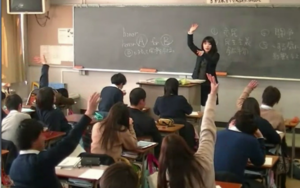Updated May 31, 2023
Mika Ishino, Associate Professor at the Faculty of Global and Regional Studies, noted that the use of interrogative tags such as ‘isn’t it?’ and ‘right?’ by the teachers can limit student involvement and learning.
Teachers often repeat a student’s answer followed by an interrogative tag such as ‘you know’, ‘isn’t it’, and ‘right?’, to ensure that students feel like a collective during a classroom discussion. A new study by Ishino explored the use of ‘ne’, a term with similar meaning as these interrogative tags, that are commonly used by Japanese teachers. The study found that using this strategy can often limit the response of some students and prevent follow-up questions.
https://doi.org/10.1080/19463014.2023.2190033
For more details, please see the website of Organization for Research Initiatives and Development, Doshisha University.
Research News:Can Phrases Like ‘Isn’t it?’ or ‘Right?’ Compromise Classroom Learning? New Study Answers
This achievement has also been featured in the “EurekAlert!.”
NEWS RELEASE 31-MAY-2023, Can phrases like ‘isn’t it?’ or ‘right?’ compromise classroom learning? New study answers
Teachers often repeat a student’s answer followed by an interrogative tag such as ‘you know’, ‘isn’t it’, and ‘right?’, to ensure that students feel like a collective during a classroom discussion. A new study by Ishino explored the use of ‘ne’, a term with similar meaning as these interrogative tags, that are commonly used by Japanese teachers. The study found that using this strategy can often limit the response of some students and prevent follow-up questions.
Reference
Mika Ishino (2023) Inclusive third-turn repeats: managing or constraining students’ epistemic status?, Classroom Discourse, DOI: 10.1080/19463014.2023.2190033https://doi.org/10.1080/19463014.2023.2190033
For more details, please see the website of Organization for Research Initiatives and Development, Doshisha University.
Research News:Can Phrases Like ‘Isn’t it?’ or ‘Right?’ Compromise Classroom Learning? New Study Answers
This achievement has also been featured in the “EurekAlert!.”
NEWS RELEASE 31-MAY-2023, Can phrases like ‘isn’t it?’ or ‘right?’ compromise classroom learning? New study answers

While teachers use the third-turn repeat strategy to encourage student inclusion, it might silence curiosity.
Image courtesy: Mika Ishino
Usage restrictions: No restrictions Image license: Original content
Mika Ishino, Associate Professor at the Faculty of Global and Regional Studies, noted that the use of interrogative tags such as ‘isn’t it?’ and ‘right?’ by the teachers can limit student involvement and learning.
Teachers often repeat a student’s answer followed by an interrogative tag such as ‘you know’, ‘isn’t it’, and ‘right?’, to ensure that students feel like a collective during a classroom discussion. A new study by Ishino explored the use of ‘ne’, a term with similar meaning as these interrogative tags, that are commonly used by Japanese teachers. The study found that using this strategy can often limit the response of some students and prevent follow-up questions.
https://doi.org/10.1080/19463014.2023.2190033
For more details, please see the website of Organization for Research Initiatives and Development, Doshisha University.
Research News:Can Phrases Like ‘Isn’t it?’ or ‘Right?’ Compromise Classroom Learning? New Study Answers
This achievement has also been featured in the “EurekAlert!.”
NEWS RELEASE 31-MAY-2023, Can phrases like ‘isn’t it?’ or ‘right?’ compromise classroom learning? New study answers
Teachers often repeat a student’s answer followed by an interrogative tag such as ‘you know’, ‘isn’t it’, and ‘right?’, to ensure that students feel like a collective during a classroom discussion. A new study by Ishino explored the use of ‘ne’, a term with similar meaning as these interrogative tags, that are commonly used by Japanese teachers. The study found that using this strategy can often limit the response of some students and prevent follow-up questions.
Reference
Mika Ishino (2023) Inclusive third-turn repeats: managing or constraining students’ epistemic status?, Classroom Discourse, DOI: 10.1080/19463014.2023.2190033https://doi.org/10.1080/19463014.2023.2190033
For more details, please see the website of Organization for Research Initiatives and Development, Doshisha University.
Research News:Can Phrases Like ‘Isn’t it?’ or ‘Right?’ Compromise Classroom Learning? New Study Answers
This achievement has also been featured in the “EurekAlert!.”
NEWS RELEASE 31-MAY-2023, Can phrases like ‘isn’t it?’ or ‘right?’ compromise classroom learning? New study answers